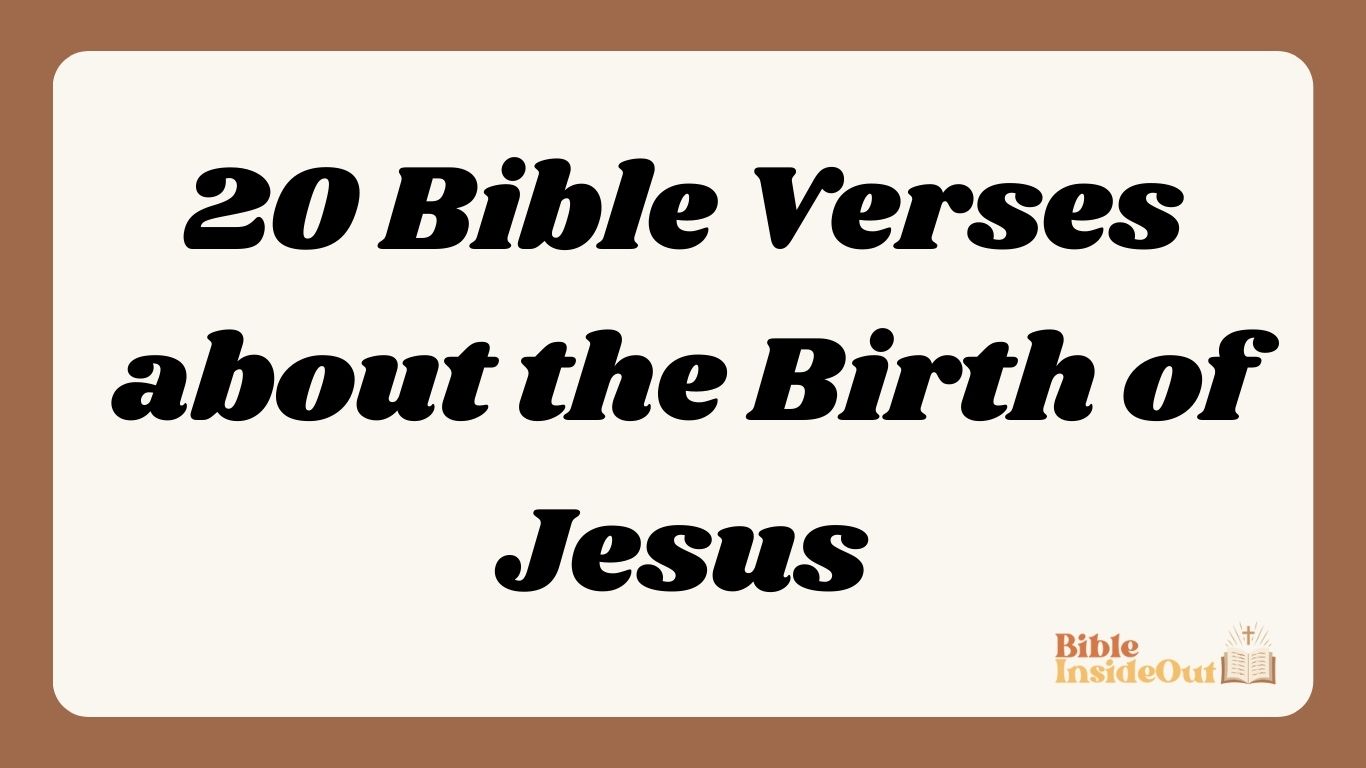20 Bible Verses about the Birth of Jesus (With Commentary)
Seeking comfort and inspiration this holiday season? The story of Jesus’ birth resonates with hope across the globe. Delve into Bible verses that paint a vivid picture of this miraculous event, illuminating its profound significance.
Discover peace and joy in the narrative that changed history—let’s explore together.
Prophecies of the Messiah’s Birth
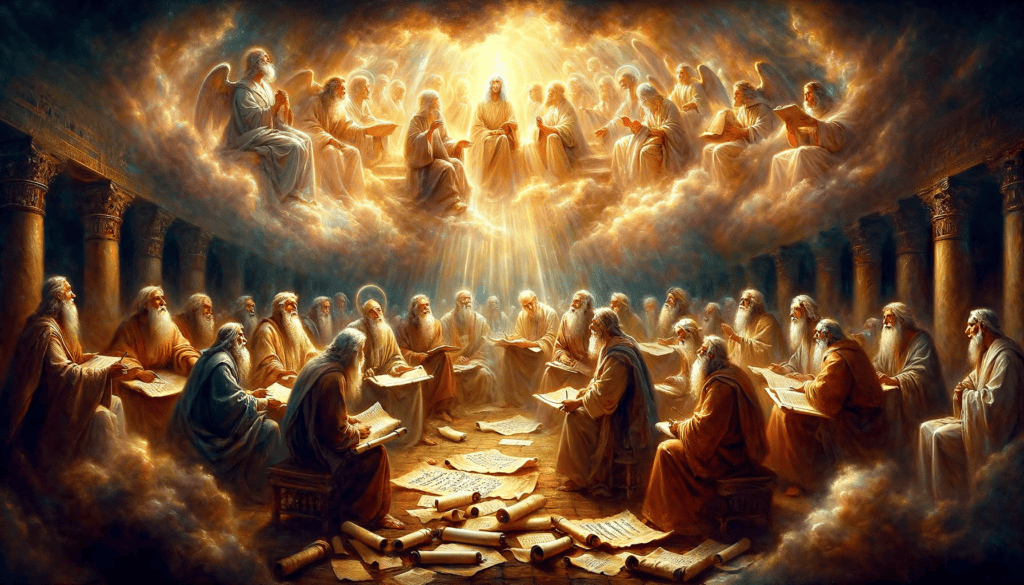
Isaiah 7:14
"Therefore the Lord Himself will give you a sign: Behold, the virgin shall conceive and bear a Son, and shall call His name Immanuel."
A young woman, a virgin, will give birth to a son. They will call him Immanuel, which means “God with us.” This old prophecy from the book of Isaiah speaks of a miraculous event. It points to Jesus’ birth as something special that God had planned long ago.
Matthew’s Gospel connects this verse directly to Jesus Christ’s virgin birth. People have argued about what the prophet really meant. Yet, for many believers, it is clear: this message was about the coming of Jesus as Savior.
It showed God keeping His promise by sending Emmanuel—God right here with us.
Micah 5:2
"But you, Bethlehem Ephrathah, Though you are little among the thousands of Judah, Yet out of you shall come forth to Me The One to be Ruler in Israel, Whose goings forth are from of old, From everlasting."
Micah 5:2 is a big deal. It named Bethlehem as the birthplace of a future ruler centuries before Jesus was born. That’s pretty amazing if you think about it! This small town, hardly on anyone’s radar, got marked on the map for something huge.
This prophecy shows just how detailed God’s plan was. Even the little things matter to Him. Jesus being born in Bethlehem wasn’t a last-minute decision; it was part of a master plan all along.
And this King wasn’t going to be just any leader – He’d be like a shepherd to His people, bringing peace and showing us what true leadership looks like.
Isaiah 9:6
"For unto us a Child is born, Unto us a Son is given; And the government will be upon His shoulder. And His name will be called Wonderful, Counselor, Mighty God, Everlasting Father, Prince of Peace."
Isaiah 9:6 shines a bright light on the birth of Jesus Christ. It calls Him Wonderful Counselor and Mighty God, showing He is both human and divine. This verse gives people hope by promising a ruler from David’s line who will bring eternal peace.
The names in Isaiah 9:6 tell us about Jesus’s role. They say He is our Everlasting Father and Prince of Peace. These words fill hearts with joy at Christmas as we celebrate His coming to carry the government on His shoulders and guide us with wisdom.
Jeremiah 23:5
"Behold, the days are coming,” says the Lord, “That I will raise to David a Branch of righteousness; A King shall reign and prosper, And execute judgment and righteousness in the earth."
Jeremiah 23:5 paints a vivid picture of the promised Messiah. It tells us that this ruler will come from King David’s line—like a branch shooting up from an ancient, sturdy tree.
His rule will be wise and just, bringing safety and fairness to the land.
This prophecy isn’t just old words—it came true with Jesus. He was born as that righteous leader, fulfilling God’s long-time promise. Think about it; over centuries, families passed down stories of this future hope, until Mary and Joseph welcomed Him into the world in Bethlehem.
Truly amazing!
Hosea 11:1
"When Israel was a child, I loved him, And out of Egypt I called My son."
Hosea 11:1 connects the birth of Jesus to a deep love story. God calls Israel His child and expresses His affection, saying, “Out of Egypt I called my son.” This echoes in the life of Jesus—who also came out of Egypt after fleeing there with Mary and Joseph.
The verse serves as a bridge linking Jesus back to ancient prophecies. It paints a picture where Christ represents both Israel’s history and its future hope.
This small piece from Hosea casts Jesus as fulfilling a role set long ago by prophets. It hints at His mission on earth intertwining with the very identity of God’s chosen people. As readers explore this link, they see how Old Testament threads weave into New Testament revelation—showing that Jesus is indeed central to the biblical narrative, just as predicted by hose like Hosea centuries before His arrival.
The Annunciation
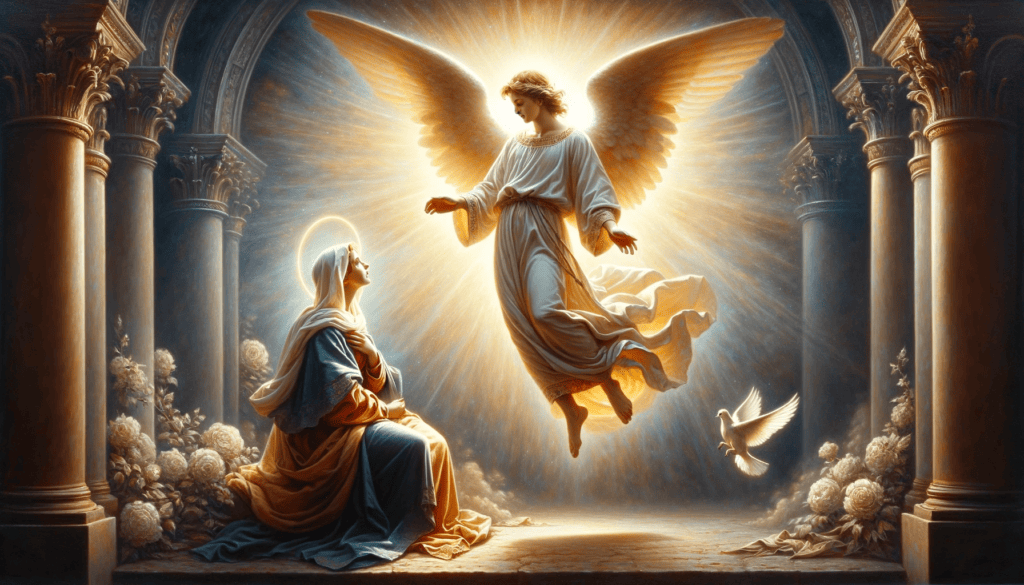
Luke 1:30-31
"Then the angel said to her, 'Do not be afraid, Mary, for you have found favor with God. And behold, you will conceive in your womb and bring forth a Son, and shall call His name JESUS.'"
Gabriel appeared to Mary and gave her big news. He told her not to fear because she was chosen for something special. Soon, she would have a baby boy, and his name would be Jesus. This wasn’t just any baby—he was the Son of God himself! The promise that Mary would conceive filled people with wonder, showing God’s plan in action.
Mary’s role as Jesus’ mother changed history forever. With one angelic visit, the Christmas story started to unfold right there in Nazareth.
Matthew 1:20-21
"But while he thought about these things, behold, an angel of the Lord appeared to him in a dream, saying, 'Joseph, son of David, do not be afraid to take to you Mary your wife, for that which is conceived in her is of the Holy Spirit. And she will bring forth a Son, and you shall call His name JESUS, for He will save His people from their sins.'"
Joseph had a dream that changed everything. An angel of the Lord came to him saying, “Joseph, son of David, do not fear to take Mary as your wife.” The message was clear: the baby she carried was from the Holy Spirit.
This child would need a special name—Jesus—which means “the Lord saves.” Why? Because he was destined to save his people from their sins. Joseph trusted this heavenly vision and followed through with courage and faith.
In these verses, we see God’s plan unfolding in a remarkable way. They show us Jesus wasn’t just any baby; he was the promised Savior, born of a virgin, fulfilling ancient prophecies exactly as foretold.
His arrival sets into motion the divine salvation story crafted by God Himself—a tale of redemption for all who believe in Him.
Luke 1:35
"And the angel answered and said to her, 'The Holy Spirit will come upon you, and the power of the Highest will overshadow you; therefore, also, that Holy One who is to be born will be called the Son of God.'"
Luke 1:35 reveals a heavenly message—Mary will have a child by the Holy Spirit’s power, and this baby will be called God’s Son. This moment is unique in history; no other birth has ever happened this way.
Mary, a young woman from Nazareth, becomes part of God’s huge plan. She’ll give birth to Jesus—the one who brings us all hope and salvation.
The angel Gabriel tells Mary she’s chosen for an incredible role. Her son Jesus will fulfill ancient promises about the Messiah. His coming shows God’s love in a real, powerful way—as both human and divine.
Luke 1:42-43
"And she spoke out with a loud voice and said, 'Blessed are you among women, and blessed is the fruit of your womb! But why is this granted to me, that the mother of my Lord should come to me?'"
Elizabeth, filled with the Holy Spirit, exclaimed to Mary that she was blessed among women. Her joy spilled over as she realized Mary’s baby was the Lord Himself. This moment fused two miraculous events—Mary’s faith and her role in bringing forth Jesus.
Acknowledging Jesus as the Lord right from Mary’s womb, Elizabeth praised God for what He had done.
Imagine the wonder of it all! This wasn’t just any baby; this was God’s love entering the world through Mary. The encounter beams with divine glory—here stands a woman, chosen to be mother to Jesus, called “blessed” by another who felt honored even to be there.
No ordinary greeting this was—it marked a turning point in history where belief met prophecy head-on.
Matthew 1:23
"'Behold, the virgin shall be with child, and bear a Son, and they shall call His name Immanuel,' which is translated, 'God with us.'"
“Look, the virgin will conceive and give birth to a son, and they will call him Immanuel,” says Matthew 1:23. This verse shows God’s promise coming true from Isaiah’s old words. A young woman named Mary is at the heart of this amazing event.
She carries a baby that will be known as “God with us.”.
Imagine the scene: angels announce it, shepherds witness it, and wise men follow a star—all for this child in Bethlehem. His name is Jesus, but He’s not just any baby; He brings hope to everyone as Immanuel.
The Nativity
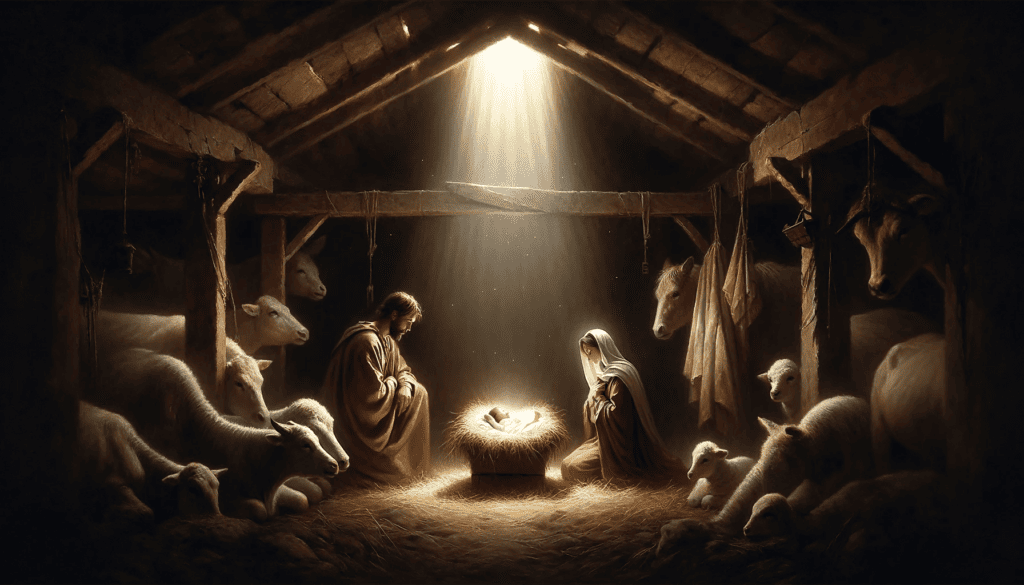
Luke 2:6-7
"So it was, that while they were there, the days were completed for her to be delivered. And she brought forth her firstborn Son, and wrapped Him in swaddling cloths, and laid Him in a manger, because there was no room for them in the inn."
Luke 2:6-7 captures a pivotal moment—Jesus’s humble birth. In a simple stable, away from the comfort of an inn, Mary brought forth her firstborn son. She wrapped him in swaddling clothes and laid him in a manger because there was no room for them elsewhere.
This event fulfilled ancient prophecies and marked the arrival of God in human form. The setting was modest, yet the impact was monumental. Jesus, Savior of the world, started his earthly life cradled in a feeding trough, signaling that he came for all people, rich or poor.
Matthew 2:1
"Now after Jesus was born in Bethlehem of Judea in the days of Herod the king, behold, wise men from the East came to Jerusalem."
In Matthew 2:1, we learn about the birth of Jesus in Bethlehem of Judea. This event took place during the time of King Herod. Wise men from the east arrived in Jerusalem. They were searching for the newborn king of the Jews.
The star they followed led them to Bethlehem. This fulfilled what prophets wrote long ago.
The wise men brought gifts for Jesus—gold, frankincense, and myrrh. Their journey shows us that even at his birth, Jesus was recognized as special by people far and wide. The magi honored him as a king.
Their visit reminds us that Jesus’s arrival was not just an ordinary event but part of a much larger plan.
Luke 2:10-11
"Then the angel said to them, 'Do not be afraid, for behold, I bring you good tidings of great joy which will be to all people. For there is born to you this day in the city of David a Savior, who is Christ the Lord.'"
The angel brought thrilling news—the birth of Jesus in Bethlehem, the city of David. This wasn’t just any baby; He was the Savior, Christ the Lord. Luke 2:10-11 captures this heavenly announcement, sharing joy for all people to hear.
Picture shepherds out in the fields that night, startled by a burst of glory from above. An angel tells them not to fear because they bring good tidings—news that would change the world forever.
The message rings out clear and true: A savior has come!
Matthew 2:9-11
"When they heard the king, they departed; and behold, the star which they had seen in the East went before them, till it came and stood over where the young Child was. When they saw the star, they rejoiced with exceedingly great joy. And when they had come into the house, they saw the young Child with Mary His mother, and fell down and worshiped Him. And when they had opened their treasures, they presented gifts to Him: gold, frankincense, and myrrh."
Magi from the east arrived in Jerusalem, their eyes on a celestial guide. This star they followed led them straight to Jesus. They didn’t just stumble upon this newborn King; the sky itself was their map.
Imagine—travelers journeying far, drawn by a promise shining above.
Inside, with gifts in hand—gold, frankincense, and myrrh—the magi bowed before Him. These were not random presents; each held deep significance for Jesus’s future. A tiny child lay there, yet He commanded awe and reverence as prophecies whispered of His birth echoed through time.
Luke 2:12
"And this will be the sign to you: You will find a Babe wrapped in swaddling cloths, lying in a manger."
This will be a sign to you: You will find a baby wrapped in swaddling cloths and lying in a manger. Luke 2:12 shows us the scene at Jesus’ birth. Angels told shepherds about these simple signs.
They raced to see Jesus, who lay humbly in a bed of hay.
The message was clear – Christ’s arrival was for everyone, not just the high and mighty. Wrapped snugly, nestled among animals, he was God’s promise come to life. This verse proves prophecies right; true power rests even in a lowly stable.
Responses to His Birth
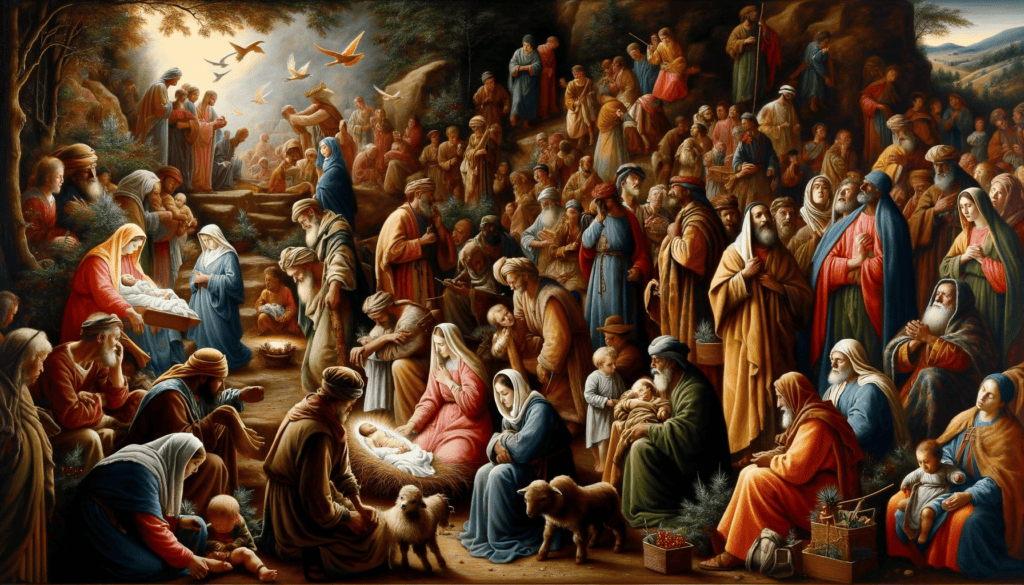
Matthew 2:16
"Then Herod, when he saw that he was deceived by the wise men, was exceedingly angry; and he sent forth and put to death all the male children who were in Bethlehem and in all its districts, from two years old and under, according to the time which he had determined from the wise men."
Herod the king felt threatened by the birth of Jesus. He feared losing his throne to this new “king” talked about by wise men from the east. In Matthew 2:16, we learn about Herod’s dark command.
He orders all male babies in Bethlehem, two years old and under, to be killed. This event is known as the massacre of the innocents.
This verse shows us early on that Jesus’ life was full of danger. His arrival sparked fear in powerful people like Herod. The brutal order to kill young boys is a sad part of the story around Jesus’ birth.
It reveals just how much opposition Jesus faced from the start.
Luke 2:15-16
"So it was, when the angels had gone away from them into heaven, that the shepherds said to one another, 'Let us now go to Bethlehem and see this thing that has come to pass, which the Lord has made known to us.' And they came with haste and found Mary and Joseph, and the Babe lying in a manger."
The shepherds hurried to Bethlehem after angels told them of Jesus’ birth. They found Mary and Joseph, with baby Jesus in a manger. This scene was just like the heavenly messengers said.
It was a special moment—the first visitors to see the newborn Savior lay eyes on hope for all mankind. The glory of the Lord shone around that simple place, turning it into a site of divine encounter.
Visiting this holy family fulfilled ancient prophecies and sparked joy among those who witnessed it firsthand—simple men chosen by God to welcome His son into our world. These shepherds would later spread the news, telling others about the incredible event they had experienced, igniting wonder and belief in hearts across the land.
Matthew 2:13-14
"Now when they had departed, behold, an angel of the Lord appeared to Joseph in a dream, saying, 'Arise, take the young Child and His mother, flee to Egypt, and stay there until I bring you word; for Herod will seek the young Child to destroy Him.' When he arose, he took the young Child and His mother by night and departed for Egypt."
God sent an angel to Joseph in a dream. He warned him about King Herod’s plan to hurt Jesus. Quickly, Joseph woke up, and he took Mary and baby Jesus away in the night. They left for Egypt because it was safe from Herod’s power.
This escape fulfilled what God had said through his prophets long ago.
Their journey was not easy but necessary to protect the young Messiah. Mary and Joseph kept Jesus safe by following God’s command without delay. They stayed there until it was safe to come back home, making sure that the infant Savior could grow up far from danger.
Luke 2:20
"Then the shepherds returned, glorifying and praising God for all the things that they had heard and seen, as it was told them."
The shepherds went back, singing praises to God for all they had heard and seen. Just as the angel had told them, they found baby Jesus with Joseph and Mary. This verse shows how people immediately shared the good news of Jesus’s birth.
They recognized Him as the Savior, a joy for all to hear.
Sheepherders spread word about this amazing child after seeing Him themselves. Their hearts filled with praise because everything happened just as they were told. Luke 2:20 captures their excitement and belief in Jesus as God’s salvation sent to earth.
Luke 2:28-32
"Simeon took Him up in his arms and blessed God and said: 'Lord, now You are letting Your servant depart in peace, According to Your word; For my eyes have seen Your salvation Which You have prepared before the face of all peoples, A light to bring revelation to the Gentiles, And the glory of Your people Israel.'"
Simeon, led by the Holy Spirit, cradled baby Jesus in his arms. His heart overflowed with joy as he praised God. He declared that Jesus would be a light for revelation to the Gentiles and glory for Israel.
Mary had laid her newborn son in a manger, unaware of shepherds coming soon after an angel revealed the good news to them.
Mary’s encounter with Simeon fulfilled ancient promises about the Messiah’s birth. This moment highlighted Jesus’ role in bringing salvation beyond just the people of Israel – reaching everyone around the world.
Conclusion
The story of Jesus’ birth is more than a holiday tale. It’s a promise kept, from ancient prophecies to the starlit night in Bethlehem. Each verse we’ve explored shows a piece unfolding — miracles, wonder, and hope arriving with baby Jesus.
Remember these passages; they weave the past with the present, foretelling a newborn King who brings light into our world. Find joy in these words—they’re gifts that continue to inspire and guide us through every season.
FAQs
1. What does Luke 2:7 tell us about Jesus’ birth?
Luke 2:7 shares how Mary gave birth to her son, wrapped him in cloths, and laid him in a manger because there was no guest room available for them.
2. Who were the wise men from the east mentioned in Matthew 2:11?
The wise men from the east were scholars who followed a star to find Jesus, bringing gifts of gold, frankincense, and myrrh to honor him as the Messiah.
3. Can you explain “the Word became flesh” in John 3:16?
“The Word became flesh” means God’s Son came to earth as a human baby named Jesus; it shows God’s love by sending Jesus among us.
4. Why is Bethlehem important in the story of Jesus’ birth?
Bethlehem is key because prophecy said that out of it would come a ruler over Israel – this came true when Jesus was born there.
5. What is unique about Matthew 1:18 regarding Joseph and Mary?
Matthew 1:18 tells how Joseph found out Mary was pregnant with a child from the Holy Spirit before they lived together, revealing divine involvement in Jesus’ conception.
6. How do Bible verses connect Jesus with prophecies like those written by Jeremiah or Zechariah?
Bible verses quote prophets like Jeremiah or Zechariah predicting details about Jesus’ life long before he was born—these show he truly is the Savior promised by God.

